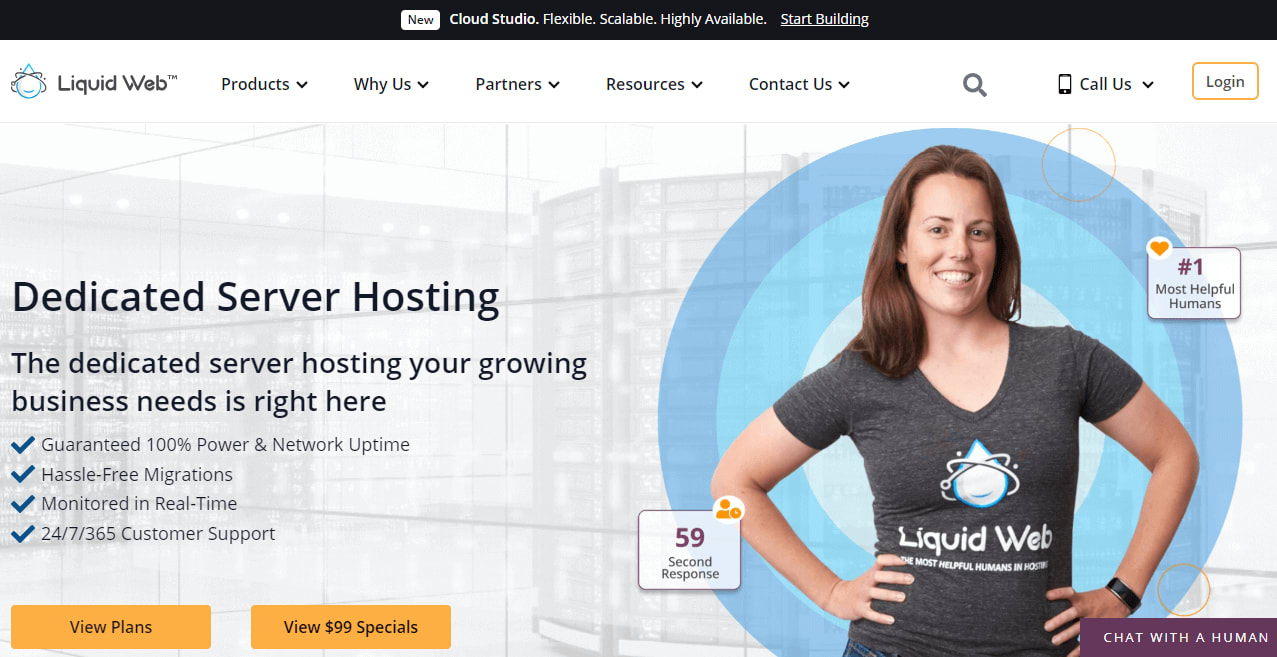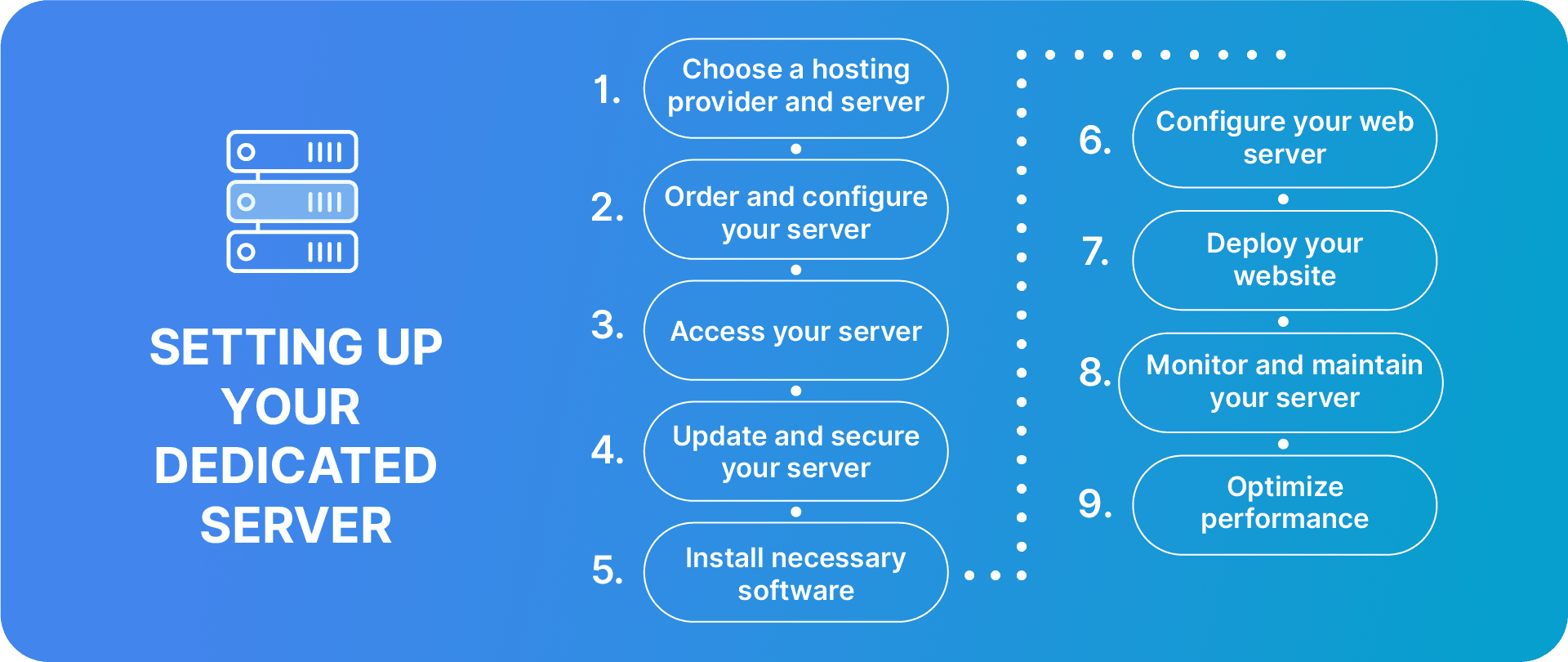
Are you facing speed or security issues with your business website? It’s a common challenge, especially for growing companies.
A dedicated server might just be the solution you’ve been looking for. As businesses expand and their digital processes become more intricate, the need for higher flexibility and control becomes crucial. Moving to a dedicated server represents a significant step forward for large enterprises that demand the best.
This article will delve into what a dedicated server is and five compelling reasons why your business could greatly benefit from one.
Key points
- A dedicated server is one where a single user or organization has exclusive access to resources.
- Benefits of a dedicated server include improved performance, enhanced security, customization, and increased reliability and scalability.
- Challenges involved in dedicated server hosting, such as data migration issues, meeting privacy standards, and reliance on hosting providers, can be addressed through proactive measures, informed decisions, and choosing the right partnerships.
- When choosing the right hosting provider, factors to consider include reliability, customer support, and pricing.
Understanding the basics of dedicated server hosting
A dedicated server in web hosting is precisely what it sounds like: a server that is fully dedicated to a single user or organization. It can even be dedicated to a single purpose, such as hosting a large and complex website, a database, or an application.
A dedicated server provides exclusive access to its resources (CPU, RAM, storage, etc.) with a unique IP address so that no other websites or applications can use your processing power or bandwidth. More on the benefits of dedicated servers later on in the article.

However, as with many technical topics, there are misconceptions surrounding dedicated servers. Let’s debunk a few:
- Dedicated servers are always faster than shared hosting – While it’s true that dedicated servers can offer superior performance, they aren’t inherently faster. The speed of your server depends on various factors, such as its configuration and how well your website is optimized.
- Dedicated servers are immune to cyberattacks – Although dedicated servers typically offer more robust security than shared hosting, they are not invulnerable. Proper security measures, like firewalls and regular software updates, are essential to protect your server from potential threats.
- Dedicated servers are too expensive for small businesses – Some premium dedicated servers come with a hefty price tag, but there are many affordable options that cater to various budgets.
- Dedicated servers automatically manage website performance – Dedicated servers don’t self-optimize. They require manual performance management and optimization for the best results.
- Dedicated servers are always the best choice – They’re an excellent option for many, but dedicated servers might not be necessary for smaller, low-traffic sites or those with minimal resource needs.
With these clarifications in mind, dedicated servers are ideal for running high-traffic websites, hosting online applications, game servers, or undertaking resource-intensive tasks. If your business demands high performance and security, a dedicated server can be a game-changer.
Already, dedicated server hosting has carved out a significant portion of the market with a 28% share, coming in second only to shared hosting, which holds a 38% share.
5 key advantages of using a dedicated server
Performance
- Exclusive resources: Every ounce of CPU, RAM, and storage is reserved for one client, ensuring no bottleneck or resource contention.
- Consistent bandwidth: Without sharing, bandwidth remains unhampered, preserving the speed and accessibility of websites.
- Superior hardware: Dedicated servers are often fortified with high-performance components, including cutting-edge CPUs, generous RAM allocations, and rapid SSD storage options.
These benefits improve the user experience by providing faster load times, unwavering reliability, fortified security, and potentially higher SEO rankings.
Security
A cyber attack can disrupt business operations and tarnish a company’s reputation, leading to financial losses and customer dissatisfaction. Dedicated servers, with their enhanced security features, minimize the risk of such disruptions and ensure smooth operations. Here’s why:
- Dedicated servers offer an extra layer of protection because of their isolated nature.
- With a dedicated server, you have exclusive access so that only authorized personnel can access the server, reducing the risk of internal threats.
- If you’re in an industry with stringent data protection regulations, dedicated servers offer the flexibility to configure the hosting environment to meet compliance requirements. These regulations encompass the Insurance Portability and Accountability Act (HIPAA) for healthcare or the Payment Card Industry (PCI) security standards for payment processing.
- Dedicated server hosting empowers businesses to deploy specific security tools and protocols that cater to their unique needs. This includes encryption protocols like SSL/TLS so that data transmitted between the server and end-users remains confidential and tamper-proof.
Liquid Web’s compliant hosting solutions are designed to meet the rigorous standards of HIPAA or PCI, ensuring that sensitive data, be it patient health information or credit card details, is protected with the highest security standards.
Customization
Customization is not just about adding extra software or hardware; it’s also about optimizing. Different businesses have unique requirements, and the ability to customize server settings can make a world of difference in performance, security, and cost-efficiency.
Tailored settings ensure that resources are used judiciously. By adjusting CPU and RAM allocations, implementing load balancing, or using storage optimization techniques like deduplication and compression, businesses can prevent resource wastage and ensure smooth operations. For instance, configuring web servers like Apache or Nginx to manage a surge in concurrent connections can drastically improve site responsiveness and user experience.
For businesses seeking customization, Liquid Web’s dedicated servers and server clusters are noteworthy. They offer a suite of customization options tailored to meet client-specific needs. Whether adjusting server configurations, optimizing storage, or implementing unique security measures, Liquid Web ensures businesses have the tools to craft their ideal hosting environment.
Reliability
Reliable hosting ensures uninterrupted access to critical resources, data, and services. Even a few minutes of downtime can result in lost opportunities and customers.
Downtime doesn’t just disrupt operations; it carries a cascade of negative impacts. Users may perceive the brand as unreliable, leading to decreased trust. Additionally, search engines like Google factor in website uptime when determining SEO rankings. Frequent downtimes can push your website lower in search results, decreasing visibility. Moreover, for eCommerce platforms, downtime directly translates to lost sales and revenue.
A reliable host ensures that your website remains accessible and performs optimally, reflecting positively on your business’s reputation. It’s the foundation upon which user trust and loyalty are built, facilitating seamless transactions and ensuring business continuity.
Scalability
Scalability ensures that your online presence can smoothly adjust to varying demands. Whether it’s a sudden surge in website traffic, a new application deployment, or increased data storage needs, scalable hosting ensures that these demands are met without compromising performance or causing downtimes.
With dedicated servers, businesses are not confined to a fixed set of resources. As your website traffic spikes or your online operations expand, you can effortlessly upgrade your server resources. Contrarily, during lulls or downtimes, resources can be downgraded to save costs, making it a flexible and cost-effective solution. You can modify server resources like CPU, RAM, and storage capacity on the fly so that as your business grows, your server grows with it.
The real magic of dedicated servers lies in their advanced solutions like server clustering and high availability. These setups ensure that scaling doesn’t necessitate significant downtimes or complex migrations. Instead, resources can be adjusted seamlessly, ensuring continuous availability and optimal performance.
Liquid Web offers dedicated hosting solutions that are tailor-made for growth. Their scalable dedicated servers can effortlessly adapt to high-performance requirements, ensuring that businesses are always prepared for surges in demand. Moreover, with disaster preparedness features, Liquid Web ensures that even in the face of unforeseen challenges, your online presence remains unshaken.
Setting up your dedicated server
Setting up a dedicated web hosting server requires a good understanding of networking, server management, and security principles. The specific steps and procedures may vary depending on your hosting provider, server hardware, and the software you choose.

Here’s a high-level overview of the process:
1. Choose a hosting provider and server
Research various dedicated server hosting providers. Prioritize those with a solid reputation backed by positive customer feedback.
Keep in mind your hardware necessities and bandwidth requirements that cater to your website’s projected traffic and functionality. Also, don’t forget to consider extra services like managed hosting, which is a beneficial option that takes care of numerous server management duties.
2. Order and configure your server
Place an order for the chosen dedicated server package and await confirmation of server setup, which will typically include essential details.
Once your server is set up, you’ll likely receive an email with your server’s IP address, login credentials, and a link to the management interface.
3. Access your server
4. Update and secure your server
Start by refreshing your server’s operating system and any pre-installed software to obtain the latest security updates.
Construct a stringent firewall setup, green-lighting only essential traffic. Elevate server security even more with a formidable password policy and ponder over integrating key-based authentication for amplified safety.
5. Install the necessary software
Make a pick for your web server software. Popular contenders include Apache and Nginx.
Should your web application require a database, lean towards trusted software like MySQL or PostgreSQL.
Depending on your site’s prerequisites, integrate server-side scripting languages, such as PHP.
6. Configure your web server
Tweak your web server’s settings, keeping an eye on the document root, server blocks, and the configuration of virtual hosts.
To amp up server response durations, refine web server configurations, ensuring rapid content dispatch.
7. Deploy your website
Transfer your complete website files to your server using trusted methods. Then, activate requisite databases and port any existing data.
You’ll also need to modify your Domain Name System (DNS) configurations, pointing them towards your freshly set up server.
8. Monitor and maintain your server
Employ monitoring tools to keep an eye on server health, tracking metrics like performance, disk space, and CPU usage. Periodically scrutinize security logs, staying vigilant for any signs of malicious activity.
9. Optimize performance
Periodically assess server and website performance. Refine database queries for speed when possible and consider caching mechanisms for swift content delivery.
For challenging scenarios or advanced server configurations, don’t hesitate to seek expert guidance. Liquid Web provides 24/7/365 support so that you have access to professional assistance whenever you need it.
Overcoming common pain points with dedicated servers
While dedicated servers present certain challenges, they are far from insurmountable. A combination of proactive measures, informed decisions, and the right partnerships can help businesses leverage the power of dedicated servers without getting entangled in common pain points.
Here are a few of these difficulties, along with possible solutions:
Data migration issues
One of the most daunting tasks when switching or upgrading servers is data migration. This process is intricate because of the sheer volume of data, potential software incompatibilities, varying server configurations, and the risk of data corruption or loss.
The downtime associated with migration can disrupt business operations, leading to potential revenue loss.
The solution
Incremental backups are a game-changer in this space. By saving only the changes made since the last full backup, businesses can ensure up-to-date data without the burden of transferring everything.
Utilizing specialized migration tools that handle software and configuration differences can further simplify the process. Also, planning migrations during off-peak hours or notifying stakeholders in advance can minimize business disruptions.
Meeting privacy standards
Privacy regulations like GDPR, CCPA, and others are strict, with hefty penalties for non-compliance. Ensuring dedicated servers meet these standards isn’t just about avoiding fines; it’s about maintaining customer trust and safeguarding the company’s reputation.
The solution
Regular, comprehensive privacy audits are a necessity. These audits meticulously analyze data handling, storage, and processing practices to spot potential compliance gaps. Once identified, these gaps can be addressed with tailored solutions, such as improved data encryption or revised data retention policies.
Businesses should invest in educating their teams about the latest privacy regulations, ensuring everyone is on the same page regarding compliance.
Reliance on hosting providers
Not all providers are equal; some may lack the infrastructure to truly support dedicated servers, while others might not prioritize customer support, leaving businesses stranded during critical times.
The right provider will not just offer server space but will be a partner in your digital journey. They will ensure server uptime, provide necessary security updates, and be available for support when needed.
The solution
When evaluating providers, businesses should consider factors like past performance, customer reviews, the provider’s approach to emerging technologies, and their adaptability to the ever-changing digital landscape.
Choosing the right hosting provider
As mentioned before, the foundation of any successful online venture is a robust and reliable web hosting provider. Here are some important factors to consider when selecting a hosting provider:
- Reliability: An ideal hosting provider ensures that your website remains accessible and functional at all times. Frequent downtimes not only deter visitors but can also affect your search engine rankings. It’s essential to choose a provider that boasts a high uptime guarantee.
- Customer support: Technical glitches can happen, and when they do, you need to ensure you have a proficient support team ready to assist you. A hosting provider that offers round-the-clock customer support can be a lifesaver in critical situations, ensuring minimal disruption.
- Pricing: While it’s tempting to choose the cheapest option available, remember that with web hosting, you often get what you pay for. Look for a provider that offers a balance between cost and value, ensuring you’re not compromising essential features for a lower price.
Given these factors, Liquid Web stands out as a top choice for many businesses. Liquid Web, with its blend of reliability, top-notch support, and adaptable hosting solutions, offers a dedicated hosting solution that stands out in the crowded market – here’s why:

- 24/7/365 comprehensive support: Liquid Web has exceptional customer support. With a team of hosting experts on-site and available within 59 seconds by phone or chat 24/7/365, Liquid Web ensures that your operations run smoothly no matter the hour.
- Customizable, reliable, and scalable hosting solutions: Liquid Web’s hosting solutions can be tailored to fit your specific needs. You’re protected by 100% network and power uptime SLAs, round-the-clock proactive monitoring, and a guaranteed 1,000% credit for any server downtime.
- Competitive pricing: While offering top-tier services, Liquid Web remains competitively priced, ensuring you get excellent value for your investment.
When considering your next digital move, Liquid Web is certainly worth a closer look.
Making the move to a dedicated server
As you’ve read throughout this article, dedicated server hosting offers several key benefits, such as improved performance, enhanced security, unparalleled control, and unmatched reliability. You have the ability to scale your environment to suit your demand.
This hosting solution is particularly beneficial for businesses that require robust and dedicated resources to maintain their digital presence. But remember, not all hosting providers are created equal. Choosing the right provider, like Liquid Web, ensures you get the most out of these benefits.
Ready to elevate your online operations? Contact Liquid Web today and take the next transformative step for your business success!
[ad_2]
Source link






